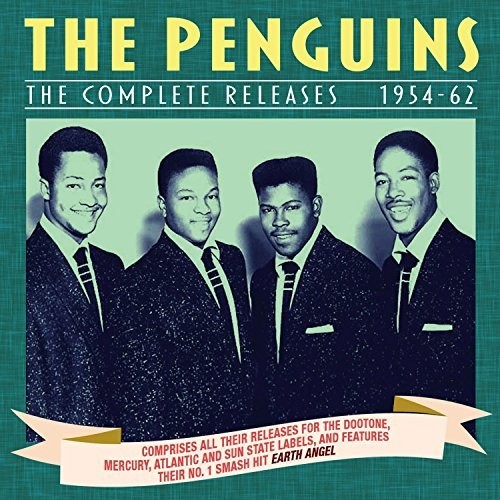Show results for
Explore
In Stock
Artists
Actors
Authors
Format
Theme
Category
Genre
Rated
Label
Specialty
Decades
Size
Color
Deals
- 4K Ultra HD Sale
- Action Sale
- Alternative Rock Sale
- Anime sale
- Award Winners Sale
- Bear Family Sale
- Blu ray Sale
- Blues on Sale
- British Sale
- Classical Music Sale
- Comedy Music Sale
- Comedy Sale
- Country Sale
- Criterion Sale
- Cult Films sale
- Documentaries Sale
- Drama Sale
- Electronic Music sale
- Horror Sci fi Sale
- Kids and Family Sale
- Metal Sale
- Music Video Sale
- Musicals on Sale
- Mystery Sale
- Naxos Label Sale
- Page to Screen Sale
- Paramount Sale
- Rap and Hip Hop Sale
- Reggae Sale
- Rock
- Rock and Pop Sale
- Rock Legends
- Soul Music Sale
- TV Sale
- Vinyl on Sale
- War Films and Westerns on Sale

Complete Releases 1954-62
- Artist: The Penguins
- Format: CD
- Release Date: 9/8/2017

Complete Releases 1954-62
- Artist: The Penguins
- Format: CD
- Release Date: 9/8/2017
- Artist: The Penguins
- Label: Acrobat
- Number of Discs: 2
- UPC: 824046321024
- Item #: 1925496X
- Genre: Soul/R & B
- Release Date: 9/8/2017

Product Notes
The Penguins were one of the several doowop groups of the 50s who took their name from a bird (others included The Orioles, The Ravens, The Flamingos and The Robins), and they are best known for their much-covered pop Top 10 and R&B No. 1 hit "Earth Angel", which later came to worldwide attention when it was used in the "Back To The Future" movie. Formed at high school in Los Angeles, the group developed a style that was as R&B and rock 'n' roll as it was pure doowop. "Earth Angel" was their second release for the small Dootone label, and it topped the R&B charts, crossing over to reach No. 8 in the pop charts, where it was overtaken by the Crew Cuts' cover version. They moved to the Mercury label, and then to Atlantic, but could not repeat their chart success, despite releasing a string of top class R&B material under the aegis of their manager/producer Buck Ram, whom their shared with The Platters. After some line-up changes, the group eventually broke up in the early '60s. This 42-track collection comprises every track released under the Penguins name on singles, their LP and EPs during their career, so is a definitive overview of their career, and a fine example of their genre
Credits
-
Artist(s)The Penguins

